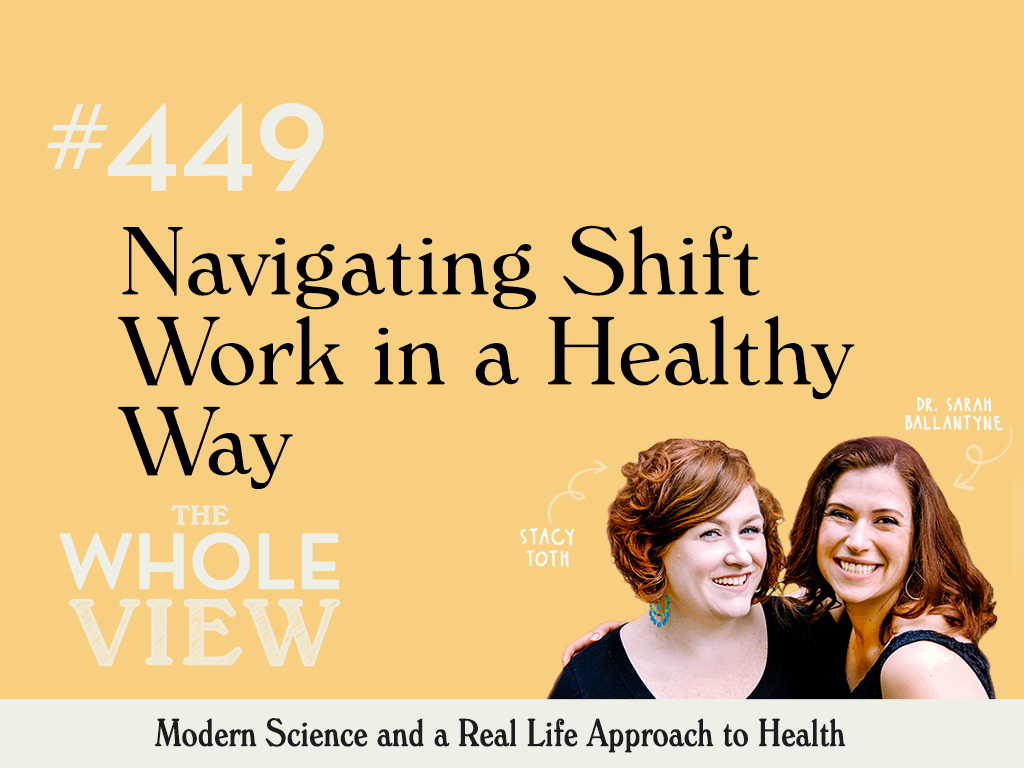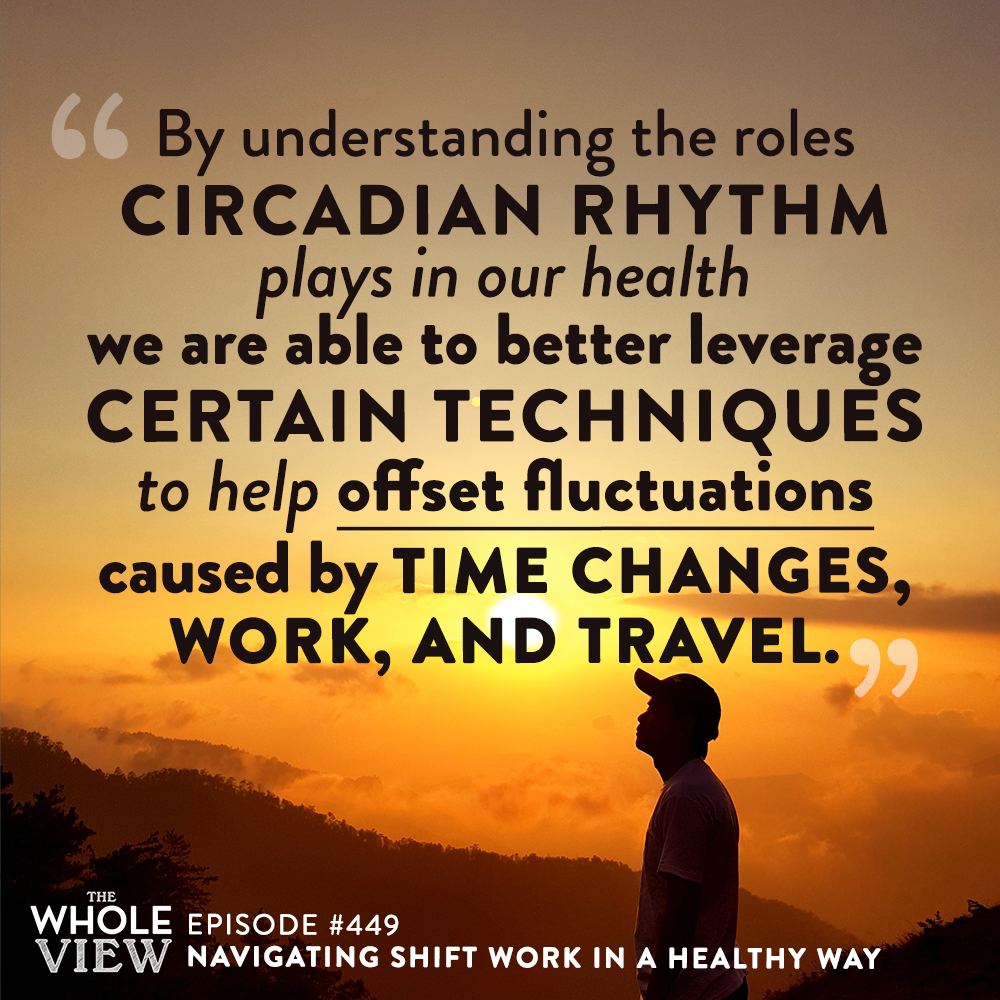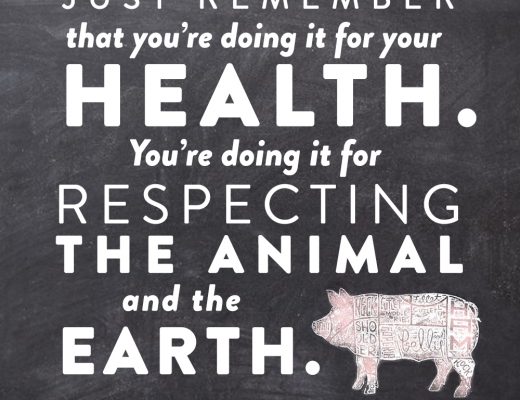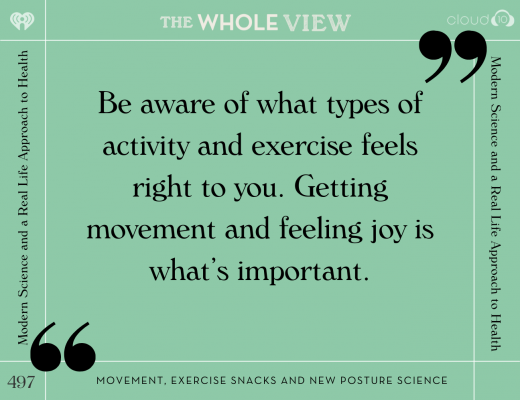
Welcome to episode 449 of The Whole View! This week, Stacy and Sarah discuss circadian rhythm and navigating shift work in a healthy way. They look at the science behind circadian rhythms to see how they work and even offer techniques you can use to help adjust to a constantly fluctuating schedule.
If you enjoy the show, please review it on iTunes!
The Whole View, Episode 449: Navigating Shift Work in a Healthy Way
Welcome back to episode 449! (0:28)
There are many people throughout the US and the world with careers that involve working on alternate shifts.
This constant fluctuation in waking and sleeping hours can make navigating shift work difficult since your circadian rhythm never gets the opportunity to fully stabilize.
However, if you work regular shifts like Stacy and Sarah, you can still utilize the techniques in this show for things like jet lag and daylight savings.
Sarah explains that there aren’t many differences between jet lag and working alternate shifts because they impact circadian rhythms.
This show was inspired by this listener question:
I have been dialing in my nutrition, activities and sleep and feel so much better for it. But due to my work schedule everytime I come off a rotation of night shifts it takes me 3 days to recover back to my new normal again. I started working 12 hour shifts (7am to 7pm for 4 days then 2 days off. Then 7pm to 7am for 4 nights, then 6 days off to rest).
It’s like having jetlag every 16 days! Is there anything I can do to help and support my body through this? Many thanks,
Sophie
This is a common issue for many over the last year- specifically front-line workers through the pandemic.
Many thanks to front-line workers and medical staff for their flexibility to be there when we’ve needed them.
Sarah remembers when this alternation between day shift and night shift was introduced. Before it, people would work days or nights and stick with that one shift all the time.
Balance and fairness are important in the workforce, yes. However, Sarah feels it’s important to talk about why having a consistent night shift would be better than going back and forth.
Ideal Circadian Rhythm Entrenchment
Forcing our circadian clock to adapt is harder on our bodies than living out of sync with the sun. (6:40)
Things like bright lights indoors in the evening, not spending enough time outside, eat at weird times or too late, and even over air condition our house during the day can mess with that entrenchment even if we work during the day.
Working a shift that’s out of sync with the sun requires us to “overwhelm” the signal we get from the sun.
We can do this by ensuring our sleeping environment is very dark, challenging if we’re sleeping during the day.
Double layered blackout curtains can help block out the sun from windows.
Sarah also recommends covering anything with LED lights (especially blue and green) with duct or masking tape.
Temperature shifts are also big signalers to our circadian rhythms. Ensuring our sleeping environment is cold when we’re sleeping and warmer can help make navigating shift work easier.
Bright lights can inhibit our body’s melatonin production, which signals that it’s time for sleep.
Amber-tinted glasses block blue light and can help support sleep.
Even when you’re not asleep during your “night,” turning off lights, keeping the blinds closed, programable LED lightbulbs and avoiding screens an hour before bed can help you trick your body into thinking it’s nighttime.
Stacy and Sarah have talked in past shows about how melatonin is sometimes used for sleep disorders. It also works great for jet lag and shift workers.
Manage stress since dysregulated cortisol can hinder circadian rhythm entrenchment.
Make sure you’re not vitamin D deficient since vitamin D is vital for biorhythms, and if you sleep during the day, you may not be getting enough sunlight.
Navigating Shift Work On Nights Off
Staying on one schedule isn’t always practical when you work nights because most of the world operates on daylight hours. (18:45)
Seeing friends and family members and running errands are all things you’d probably do during the day on days off.
Sarah recommends shopping at the end or beginning of your day, right when the store opens at 7am or before it closes at 7pm.
Meet your friends for your breakfast and dinner, or vice versa, to keep a generally similar schedule to your workdays.
It is also possible to shift your day partially, say 2-3 hours instead of a full 12 hours. This frees up more time for family activities but not so jarring for your body.
Shift work is often associated as a cause of insomnia due to the constant changing of when we’re awake.
Adequate sleep is also tied to insulin production, metabolism, and immune system function!
Shift work impacts sleep quality through disruption of the circadian clock.
If we don’t find ways to healthy manage it, it impacts insulin production, metabolism, immune system function, and more.
Navigating Shift Work That Alternates
Sarah turns her focus toward Sophie’s situation of constantly switching from days to nights through her workweek. (24:20)
She adds that experiencing 3 days of jet lag for a 12-hour time shift is actually pretty normal-whether it’s through changing time zones or work change.
A lot of the studies done on this topic use jet lag as a model. However, it is well understood in the science community that the two are basically the same thing and affect the body in the same way.
You can help your body adjust to the new time is by going outside and have that light signal to jumpstart resetting your clock.
If you’re flying, you can do this by reorienting your time to the time of your destination as soon as you get on the plane.
You can also use melatonin (higher dose, up around 1mg) for those first few nights.
Make sure you’re managing stress! Cortisol has to shift, too, and having dysregulated cortisol, to begin with, makes the transition harder. Vitamin C, omega-3s, and magnesium super helpful here.
If you’re going to be shifting back and forth, having a lightbox to use at the breakfast table, no matter what time of the day it is, is an ideal setup.
It doesn’t matter when you exercise, but rather that it’s on its own predictable schedule. If you like going to the gym before work, do it before work no matter when your shift starts.
So if you work out in the morning, keep doing that whenever your “morning” is (aka 6am on day shift days, 6pm on night shift days)
Basically, keep your schedule the same but shift it to 12 hours.
Meal timing is crucial to shifting, so don’t skip breakfast on “jet lag” days. You might feel hungry, but make sure you keep habits and patterns.
Eat similar size breakfast, lunch, and dinner whichever “time zone” you’re in and your same “fasting periods” over at least 12 hours.
Nutrients That Help
Because Sophie has tackled some big nutrition changes, it’s essential to look at what roles nutrition can play in navigating shift work in healthy ways. (33:15)
Vitamin D is important for biorhythms, so always take it during your “morning.”
Vitamin C, magnesium, and omega-3s all support healthy stress responses, including cortisol rhythms. Extra vitamin C may be helpful due to the increased oxidant formation during jet lag.
Avoid low-carb, low-fat, and low-protein because studies show it can make jet lag worse!
Another study suggests that a balanced diet containing carbohydrates, protein, lipids, and vitamins/minerals may be effective for inducing phase shifts in the peripheral circadian clock.
It also indicates simple diets such as 100% sugar, 100% protein, and 100% oil are inadequate for inducing entrainment signals.
The gut microbiome also has biorhythms, and 12-14 hours of fasting while you’re sleeping are important to regulate it.
We work on things like muscle repair when we’re sleeping and less on digestion. This means if we eat too close to bedtime, digesting that food can actually interfere with our ability to enter deep REM.
This means you shouldn’t “graze” to keep yourself awake.
Stacy adds that they speak of a “low carb” diet they speak in terms of very low-carb, not what you’d normally get from recommended amounts of fruits and veggies.
When you’re sleep-deprived, one of the first things your body craves is those refined carbohydrates.
Filling that craving with fruits and veggies can balance hormones and get you back into a healthy rhythm.
Symptom Management
It’s important to recognize that a few days of that jet lag feel will be pretty normal regardless. (43:35)
Some caffeine in your “morning” is okay. However, be careful not to overdo it or to take it too late in the day.
There’s many studies showing how great power naps are for improving cognitive performance and energy without taking away from nighttime sleep. These are naps between 10 to 30 minutes long naps to stay in Stage 1 and Stage 2 sleep.
You need at least 3 minutes of stage 2 sleep for them to work. If you get into Stage 3, you’ll know it by feeling groggy when you wake.
Make sure not to rely on sugar or snacking as a crutch to stay awake as they will prolong the feeling of jet lag long-term.
Activity can keep up energy levels, so make sure you’re getting enough regular exercise. Just be sure that the first day’s activity doesn’t require great judgment since you might be tired.
Final Thoughts
Stacy revisits the importance of breakfast and how eating shortly after we wake up can signal our bodies that it’s time to wake up. (47:45)
Sarah references these two shows: Intermittent Fasting and Is Breakfast the Most Important Meal of the Day?
Instead of taking energy shots or drinking a lot of caffeine, add daylight and liver pills to your regimen.
Anything that happens inside our bodies uses energy, so ensuring we give our bodies things they can use to make that energy is crucial to optimally functioning.
Supplements are great, but getting nutrients from whole foods is better (i.e., liver pills).
If you’ve yet to join the Patreon family, pop over for more behind the scenes. Patreon gives you access to how Sarah and Stacy really feel about these topics and supports shows like this one that aren’t sponsored.
Thanks so much for listening, and we will see you next week!





